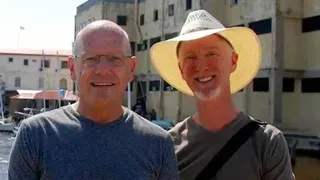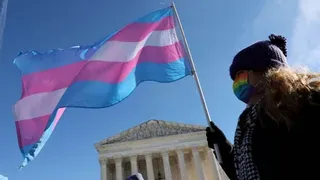January 24, 2013
SFPD Backtracks on Condoms
Chris Sosa READ TIME: 4 MIN.
San Francisco Police Chief Greg Suhr is keeping a ban on documenting condoms as evidence of prostitution temporary for now, based on an agreement between the offices of the district attorney and public defender.
The news comes a week after a Bay Area Reporter article cited law enforcement officials saying that the ban would be permanent. But instead, the SFPD bulletin extended a temporary period for another 90 days.
Suhr's position comes despite District Attorney George Gasc-n saying his office didn't ask the police department to take such a stance, and Public Defender Jeff Adachi saying he hadn't known about the extension until after the Bay Area Reporter contacted his office.
"I'm hopeful that this ends up being a permanent accord," Suhr said in a January 15 interview. "If it has even one less person get any form of STD, it's a good policy."
However, if the other offices determine the ban shouldn't be permanent, Suhr doesn't want to have to switch his department's policy again, and he said the prohibition would remain temporary for now.
"I've put the bulletin out, and I don't want to confuse the officers," he said.
Suhr, who said his department has a duty to provide the most complete reports it can, also said someone from his department would make an inquiry toward the end of the 90-day period, which started January 14, to see what the other agencies are doing. He said that the policy of not seizing condoms would remain in place regardless of what happens after the three-month extension is over.
Sex worker advocates, public health officials, and others have expressed concerns that using condoms as evidence of prostitution discourages people from carrying them, thereby putting them at greater risk for HIV and other sexually transmitted diseases.
Last summer, Suhr issued a department-wide bulletin reminding officers not to confiscate condoms as evidence of prostitution.
He had planned to release another bulletin last week also instructing staff not to photograph or otherwise document possession of condoms in prostitution cases. But when police issued the document late Friday, January 11, it was only for a 90-day period.
Suhr said Tuesday that the change came after an officer called the DA's office just before the bulletin was released and was told that a three-month trial period that had expired December 31 was being extended for another three months. It appears, however, that the DA's staff didn't specifically mention the public defender's office, and the officer may have misunderstood.
The offices of the district attorney and public defender had stipulated that from October 1 through December 31, 2012 in misdemeanor cases involving prostitution charges, no argument would be made "regarding the presence or absence of condoms," according to a letter Gasc-n wrote to another city official in October.
In that message, he said the impact of the policy change would then be reviewed and "[b]ased on the outcomes we will determine the appropriate next steps."
In an interview January 14, Gasc-n said his office extended the 90-day trial period in order to collect more information.
"We have very little" data, he said. "I think we have almost none."
Gasc-n said he and others in his office discussed an extension after the trial period expired and then, during a January 9 meeting with SFPD staff, he told police of the decision to extend the trial period. He said Suhr normally attends the monthly meetings, but he didn't attend the Wednesday meeting. Gasc-n said that nobody asked the SFPD to extend the trial period.
"What the police department does on its own is really completely independent from us," he said.
Gasc-n said there's "a balancing act for us" that involves public health and public safety. He said his office has to weigh the health of people "engaged in prostitution activity, whether it's sex workers or clients," against problems such as violence. Part of what they're evaluating includes the potential impact on levels of crimes such as robberies and human trafficking.
"We're trying to assess the two to make sure we do the right thing for the community," Gasc-n said.
In June, Alex Bastian, a spokesman for the district attorney's office, said prosecutors "would never charge a case simply because someone is in possession of condoms" and said use of condoms as evidence was rare.
"A vast majority of prostitution cases brought to our attention are either not charged, dealt with at the neighborhood courts, in the community justice court, or lead to a successful completion of the SAGE program and are dismissed entirely," he added, referring to the group Standing Against Global Exploitation Project, which he said aims to "educate and help prostitutes who are in a detrimental situation."
In an interview Monday morning, Public Defender Jeff Adachi said he planned to meet with Gasc-n later in the day, "and I hope to convince him to make [the ban] permanent policy." The two meet regularly.
"We want to have a policy that encourages people to practice safe sex, not penalize them for it," Adachi said. "The case we made from the beginning is that condom evidence is not necessary to prostitution investigations or prosecutions." He added, "Obviously, I'm in favor" of the 90-day trial period, "but I'd like to see it be made permanent."
At his meeting with Gasc-n, Adachi agreed to the extension, Tamara Aparton, a spokeswoman for the public defender's office. The extension became effective Monday.
In a Facebook exchange with the B.A.R. on Saturday, January 12, Naomi Akers, executive director of St. James Infirmary, which provides services to sex workers, said the ban on using condoms as evidence of prostitution should be permanent.
"This issue is a no-brainer," Akers said. "It's obvious that the criminalization of condoms in any way ... is going to discourage people from carrying them. We simply cannot afford to make it harder for people to protect themselves from HIV, [sexually-transmitted infections] and unwanted pregnancies."







